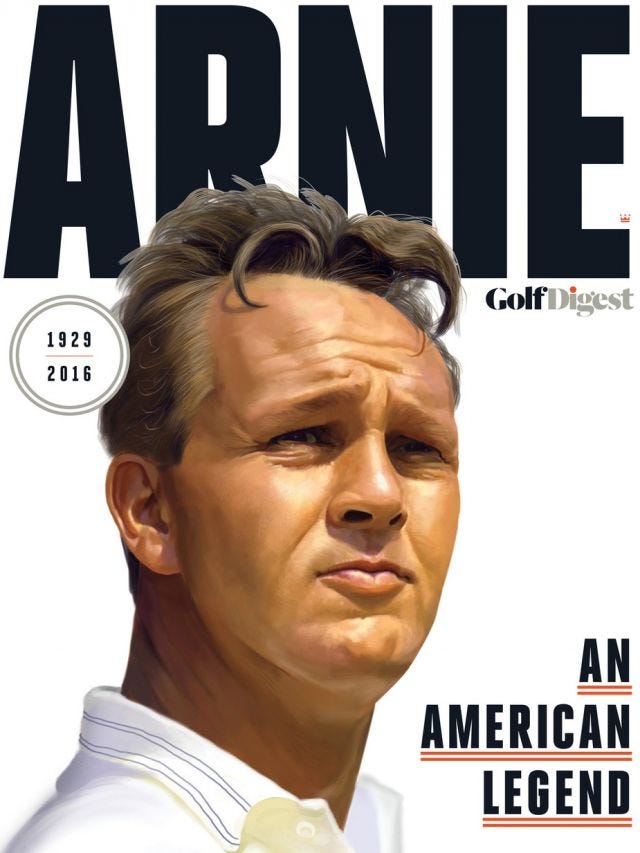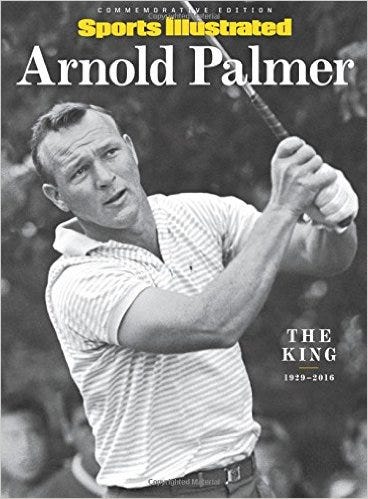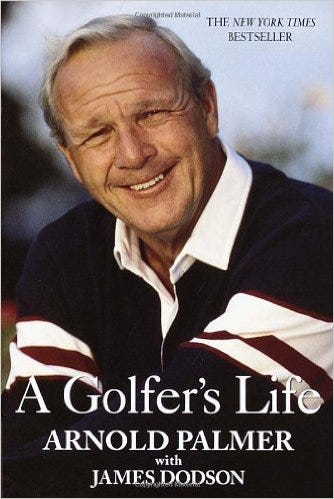Sports Biblio Digest, 10.30.16: The Exemplary Life of Arnold Palmer

News, Views and Reviews About Sports Books, History and Culture
Also In This Issue: World Series Memories; The History of Hockey Arenas; Brett Favre and Aaron Rodgers; Remembering Carlos Alberto
Welcome to the Sports Biblio Digest, an e-mail newsletter delivered each Sunday. You can subscribe here and search the archives.
This is Digest issue No. 60, published Oct. 30, 2016. The Digest is a companion to the Sports Biblio website. To view this newsletter in a browser, please click here.
I’d love to hear what you think about the Digest, and Sports Biblio. Send feedback, suggestions, book recommendations, review copies, newsletter items and interview requests to Wendy Parker at sportsbiblio@gmail.com. You can also follow Sports Biblio on Twitter and hit the “like” button on Facebook.
* * * * * * * *
When Arnold Palmer died last month, the finishing touches were being made for what had long been planned to be his final book.
In “A Life Well Played,” published Tuesday by St. Martin’s Press, Palmer admits he never cared for the nickname “The King,” long bestowed on him by fans, writers and his legions of gallery admirers, “Arnie’s Army.”
In a statement issued by St. Martin’s upon the release of the audiobook version, Palmer said his final book was difficult for several reasons:
"Though I have written a number of books in the past, this one was particularly important to me, because, as I delved into the process, I realized just how much I still had to say to my friends in golf and to fans of the game in general.”
Since his Sept. 25 passing at the age of 87, the tributes have been enormous, which is fitting given the outsized influence he had not only on the sport of golf, but the emerging modern business of sports.
After Palmer signed up with agent Mark McCormack in the early 1960s, athletes around the world, in team and individual sports, would ultimately reap the benefit.

In his recent book “Players,” author Matthew Futterman (Sports Biblio review here) writes that McCormack’s work getting Palmer out of an exploitative endorsement deal with Wilson Sporting Goods:
“ . . . wasn’t simply about money. McCormack was playing a new game. The object was liberation. Freedom would lead to more money—not just for the athletes but for everyone involved. He just knew it would.”
And yet Palmer wasn’t spoiled by the money that came flowing into his bank account and the fame that soared for decades. His gritty, everyman persona had already been carved out, and he remained true to what he knew growing up in Latrobe, Pa.
Special commemorative issues of Golf Digest and Sports Illustrated reflected his endearing charisma, unfussied determination and the deep gratitude he demonstrated in the wake of his shimmering success.

Even upon receiving the Congressional Gold Medal from President Obama in 2012, his humility was on display:
“I hope, that I can thank you properly and tell you how much it means to me to be here to accept this award. I am very humbled. Thank you very much.”
This was real and genuine, and perhaps his passing dramatizes the continuing disappearance of a generation that came of age in a very different time than the post-war era that they shaped.
The truth is we’ve had a number of years to appreciate Palmer, as he advanced in age and his health declined, and as recent books about him attest: “The Classic Palmer,” by John Feinstein and Walter Iooss, Jr., and Michael Bamberger’s “Men in Green,” about Palmer’s rivalry with Jack Nicklaus.

North Carolina writer James Dodson, co-author of Palmer’s 2000 memoir, “A Golfer’s Life,” recalled a request he made for Palmer to sign a first edition copy of the book. Palmer complied, and then asked Dodson not to open it until he returned home several hours later:
"Dear Jim. Thank you for all your wonderful works. You're the greatest friend I could have. Arnold."
Dodson admitted to breaking down in tears, as he told WRAL-TV:
"He was addressing the hundreds of millions of people that loved Arnold Palmer. This was not about me.”
A Few Good (And Gut-Wrenching) Reads
Dan Barry on Maurice Lerner, once a major league prospect who later became a hit man for the mob;
Dave McKenna on Jennifer Frey, a talented sportswriter who drank herself to death;
Brad Reagan on more horrific details of sexual assault allegations against Baylor University football players; and at the U.S. Sport History blog, a review of a new book about rape in the college football world;
Neil Best on how reruns of “Gunsmoke” outrate TV sports debate shows. Hear, hear: I’ll take Festus rants over the “First Take” shouters any day;
The case of Warren Spahn’s lawsuit against the publisher of an unauthorized biography that had plenty problems with “truthiness,” including claims that he served in the U.S. Army at Remagen;

Daniel Paisner about the end of the 2016 baseball season and the passings of W.P. Kinsella and Jose Fernandez;
Thomas Boswell sets up the first World Series games at Wrigley Field in 71 years and one of the best storylines for the Fall Classic in years;
The Cubs’ team that last won the World Series in 1908 was owned by a group in Cincinnati led by—get this—a former sportswriter, and thanks to a loan from a member of a dynastic Ohio political family;
Jon Hart remembers what he was doing at the World Series 20 years ago: Working in the “inferno” of the bleachers at Yankee Stadium, as a rookie vendor hawking hot dogs and concessions;
Matt Veasey on the eight franchises that have never won a World Series;
The Onion chimes in on the World Series, as only The Onion can;
In Buffalo, there’s a place called Marinaro’s Larkin Tavern that’s a shrine to sports memorabilia;
From Outside magazine, why the times of some of the best American amateur marathon runners are slowing down;
In Mumbai, there’s a “dirty dozen” of local marathoners who have inspired a new book, “Striders At Comrades;”
Eight-man high school football, as played in Oregon, may be heading into oblivion;
As the college basketball season gears up, Mark Titus explores how Villanova’s national championship run may have a ripple effect in the sport, and for the better;
Lanny McDonald, board chairman of the Hockey Hall of Fame, defends the organization’s opaque process for selecting inductees;
Justin Hargett on the demise of the LA Kiss, an Arena Football League team started by Gene Simmons, that lasted only three seasons.
Sports Book News and Reviews
From the Montreal Gazette, an appreciation of how Westmount Arena, built in the 1920s, set the standard for modern hockey arenas. It’s a review of the newly published “Architecture on Ice” by Canadian architectural scholar Howard Shubert;

Jeff Pearlman’s new Brett Favre biography, “Gunslinger,” is getting quite a bit of attention, notably because it delves into the strained relationship between Favre and his Packers’ successor, Aaron Rodgers. At Fansided, Pearlman did this Q & A; Bleacher Report’s new longform feature, b/r MAG, published this excerpt;
A meh review of “Losing It,” a new collection by acclaimed British sportswriter Simon Barnes.
Passings
Carlos Alberto, 72, was the captain of the 1970 Brazil World Cup-winning team many consider the greatest soccer team of all time. Although often overshadowed by Pelé (later his teammate with the New York Cosmos), Carlos Alberto scored one of the more memorable goals in World Cup history in the finals over Italy.
Sports Biblio: The Website | Facebook | Twitter | Newsletter


